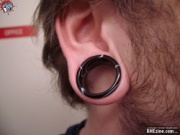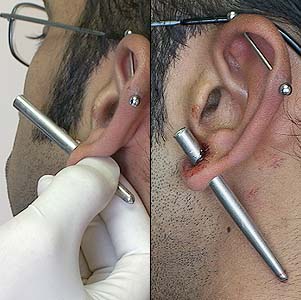Stretched
Stretching particularly when getting to larger sizes; can be a lot more extreme than you may think. It is far more time consuming than anything else in piercing, and requires far more commitment to the art and lifestyle.
Contents
Methods
As far as how stretching is done, it's simple — you merely put larger items in your piercing until you achieve the size you desire. As far at the methods go, they are quite varied and some can be quite unique, as you stretch, you will discover what is best by "listening to your body".
Starting with Large Gauge Piercings
Stretching should only be done on a Fully healed piercing, but note that you can get a head-start on the process by beginning the piercing at a Large gauge (using a Scalpel, Dermal punch, or large-gauge Piercing needle for the initial piercing).
Contrary to popular belief, a needle does not remove tissue — it cuts a curved slit. Assuming that the body part is large enough, there is no real limit as to how large you can start. Given a sufficiently experienced piercer, an initial half-inch lobe heals as quickly as a 14ga lobe. Scalpels offer larger size holes, but also require more experience to use. For the average piercer, using a 6ga or 4ga needle is a reasonable upper limit.
Taper
The most common method for stretching is the Taper, a rod that increases at one end in diameter to allow the stretch to take place as it is inserted.
Weights
Weights are a very popular way to stretch lobes for many people, but generally weights are not the best way to stretch a piercing as they can cause Migration of the piercing and Piercing Thinning of the tissue on the bottom of the piercing.
PTFE Tape
PTFE is a widely used method of stretching piercings, mainly lobes with plugs, by wraping PTFE pipe tape around the plug and then reinserting it into the piercing. This allows small incremental increases in size as some bodies may find it difficult to adapt to larger change (ie: The difference from 0ga to 00ga is 2mm, a large size when talking in terms of stretching a piercing).
Bondage Tape
Bondage Tape is now becoming a more popular method of stretching, like PTFE tape it can be wrapped around the jewelry and reinserted into the piercing, the advantage of Bondage tape is it is slightly thicker and many find easier to work with than the thinner PTFE tape, it also does not crease as much around the jewelry, meaning less buildup of dead skin cells (Ear Cheese). A knitting needle that has been cut down, is commonly used as the core for wrapping, with O-rings used to secure the taped "plug".
Permanency
Most people can stretch to at least 2ga (1/4") and still have the tissue return to normal when they remove the jewelry, however every body is unique and there are no guarantees.
Caring for your Stretches & Warnings
Stretches should be cared for by cleaning regularly with soap, then massaging with one of a number of oils/creams.
Trivia
- A person who is either obsessed with stretching their piercings, or with showing off their many stretched piercings, is known as a "Gauge Queen". Some wear this term with pride, others use it derisively.
- Referring to stretched ear lobes as "gauges" is a misnomer and incorrect.
Jewelry
A variety of jewelry is available for stretched earlobe piercings.

